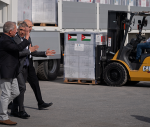You are here
‘Standing together with refugees’
Jun 17,2015 - Last updated at Jun 17,2015
World Refugee Day is an occasion to commemorate the strength and resilience of millions of people who have been forced to flee their homes in search of safety.
The numbers of displaced worldwide hit the 50 million mark in 2015, making this a truly unprecedented global crisis, with refugee issues impacting our lives now more than ever before.
Here in Jordan, this impact is again felt more acutely.
UNHCR has officially registered some 680,000 refugees; over 90 per cent of these are Syrian.
The government of Jordan estimates the total number of Syrians to be far higher, at some 1.4 million.
Sadly, with the Syrian conflict entering its fifth year and the prospect of a peaceful solution uncertain, the chances of returning home remain more distant than ever.
Jordan is now home to many women, children and men who have all found safety and security here — a country that has a proud history of providing refuge to a multitude of nationalities fleeing conflict in the region and afar: Iraqis, Sudanese and Somalis.
For UNHCR, World Refugee Day is not just a dedication to refugees but also an opportunity to thank Jordan and its people for their enduring hospitality and generosity.
This year, we chose the theme of “Standing together” in recognition of the spirit of cooperation and compassion between refugees and their Jordanian hosts.
In a country where resources are already limited, this readiness of Jordanians to share what they have with their guests is truly remarkable.
But this generosity has its limits and if we are to continue to expect states like Jordan to be able to provide access to their territory for refugees, we also need to significantly enhance the international response in addressing the chronic shortages in infrastructure, from schools to hospitals to health centres to waste storage facilities to water supply systems.
While the emergency response has been effective in providing life-saving support to refugees, this now needs to be supplemented with a much more dynamic developmental infrastructure programme.
Host communities need to sense that a degree of compensation for bearing these costs is forthcoming from the international community and that by the end of the Syrian crisis, there will be an improvement in the facilities available to Jordanians.
This is now a new phase in the refugee crisis. One that requires us to think of new ways of enabling refugees to sustain themselves, to give back to their hosts and to become less reliant on aid and host communities.
We are no longer in the emergency relief phase when people need tents and blankets. Refugees now badly need the opportunity to provide for themselves, to contribute to the host communities and, most important of all, to unlock their potential.
But this must also take place in tandem with the international community increasing its assistance to UNHCR, Jordan and neighbouring countries to help address both the immediate and longer-term imperatives of this devastating crisis.
Already tens of thousands of refugees work without authorisation in Jordan, which inevitably leads to greater vulnerability and the risk of being exploited by unscrupulous employers who withhold payment or force work in unsafe conditions.
The collective challenge for us all is to bring those working, or those who have in-demand skills, out of the grey or black market and into the formal workplace environment where they can contribute to the revenue and tax base of Jordan — to give something back.
Of course, UNHCR recognises that such proposals are sensitive, given the relatively high unemployment rate among Jordanians.
But given the hundreds of thousands of other migrant workers present in Jordan, many of whom work under the radar, could we not give the same opportunity to refugees when they would only compete with other foreign workers?
Aside from the humanitarian imperatives, this would result in a massive increase in capital retention and as many studies have indicated, much of what migrant workers earn is sent back to their country of origin in the form of remittances, but for refugees, what is earned is spent in the country of asylum.
While we continue to advocate for more rights for refugees, we also recognise the toll this crisis has had on Jordanians — especially when it comes to the massive burden placed on public infrastructure and services.
Over the last year, UNHCR — along with partner organisations and donor countries — focused on establishing ways of repaying the community for its generosity.
But of course, it is not enough, and we must all do much more to turn the supportive rhetoric for Jordan into concrete action with the provision of more schools and more hospitals.
Where development grants cannot be provided could we not secure favourable loans from regional and international financial institutions, such as the ERBD and the World Bank?
Jordan has tremendous needs and the international community needs to play its part in sharing this burden by formulating a long-term strategy to empower the region to cope with this devastating crisis.
Today we mark World Refugee Day standing together with refugees in tribute to their bravery and resilience, and paying tribute to the Jordanian people for their generosity and empathy — an example that is truly exemplary in this troubled region.
But we must be cautious not to take this generosity for granted.
The international community needs to recognise that investing in Jordan’s future will pay longer-term dividends not only for refugees, but for Jordanians and the wider region.
The writer is UNHCR’s representative to Jordan. He contributed this article to The Jordan Times.











